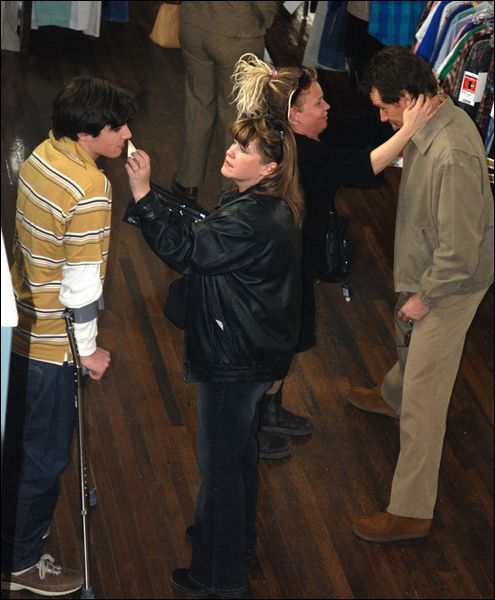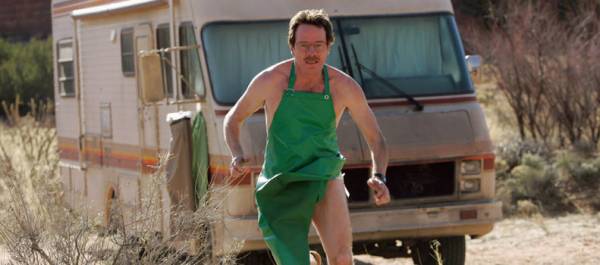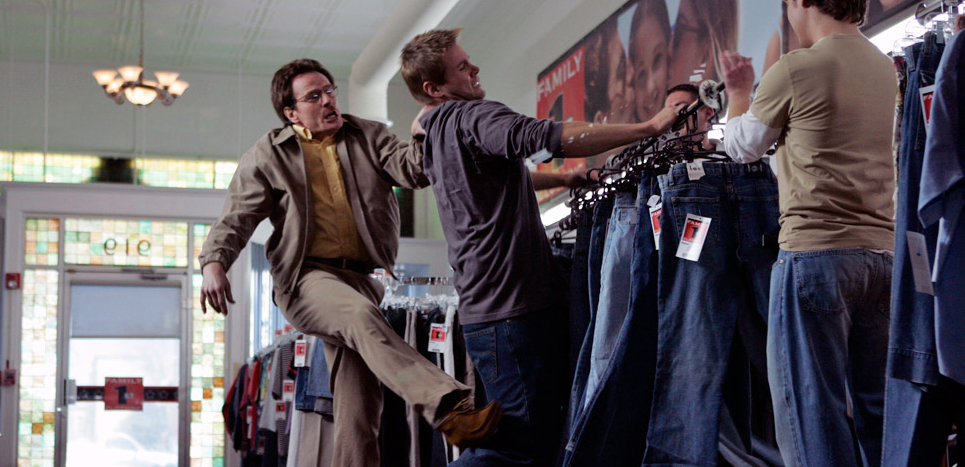“Breaking Bad” Offers Cancer, Crystal Meth - And Tighty Whities
It looks like a worthy - if very, very different - followup to "Mad Men." The new AMC original series "Breaking Bad," debuting Sunday at 10, has the amateur drug-dealing of "Weeds," the midlife crisis of "Californication," and its own dark and desperate gonzo.
Bryan Cranston - the sweetly wacko dad from "Malcolm in the Middle" - stars as New Mexico chemistry teacher Walter White, a nebbish who learns he has terminal lung cancer.
Already living from paycheck to paycheck, Walter finds himself in desperate straits. He’s devoted to his pregnant wife and their son, who has cerebral palsy. How to provide for them once he’s gone?
Walter marshals his chemistry knowledge and teams up with a former student to cook crystal meth in his RV. But of course it’s not going to go smoothly…
Cranston, series creator Vince Gilligan and other cast members met the press on a funny conference call to talk about the show.
Question: I was wondering sort of where the series goes for after this initial storyline involving Walter and Jesse and the two dealers who they get stuck in the desert with. I’ve seen the first three episodes and it’s pretty much devoted to that. I’m wondering, you know, can you talk a little bit about the arc beyond that?
Vince Gilligan: Well yes. I - essentially this is the way I’ve kind of always pitched this was that take Mr. Chips and we turn him into Scarface over the course of however many episodes we get. You know, fingers crossed, we get a lot. And then he drops dead of cancer. So…
Question: Wow.
Vince Gilligan: That’s probably the glib answer. That’s not the best. But this is in my mind always been a story of metamorphosis and transformation. And that is essentially, you know, I don’t want to paint myself into too much of a corner, but the first part of that about the cancer part, the first part of that is definitely true.
This is a guy who is in the process of reinventing himself. And not to give too much away, you know, that’s going to happen in future episodes, but Walt really is going to not just dipped a toe into this new world that he’s sort of, you know, dallying with, but he’s actually going to, you know, do a big cannonball right off the edge of the pool and into it.
And he is going to become a criminal, become, you know, some version, some post-modern version, a highly educated post-doctoral version of "Scarface." And that’s sort of where this is headed.
Question: mostly for Bryan, but for anybody, when you do a show like this with this theme, does it make you think about your own mortality? Does it make you think about the things that you still wish to accomplish?
Bryan Cranston: Gosh, with that description of Mr. Chips turning into Scarface and then dropping dead, I thought we should premiere around Christmas instead because it’s such an upbeat lighthearted fare.
You know, it kind of does it. It’s such a cliché now when someone’s near their deathbed, they say, you know, you’re never going to wish you spent more time in the office. So I think there is that.
I just think it’s ironic that you have a tendency to feel more alive — and certainly the character does — when he’s really faced with death and it really becomes really apparent to you.
I go through life forgetting that someday I’m going to die. I really do. I - oh yes, that’s right. At some point I’m just going to keel over.
I think that’s the best way to do it, just keep working, keep doing the things you enjoy. And when it happens, it happens.. So I don’t dwell on death too much.
Question: Good for you. Vince what was the genesis of the show for you?
Vince Gilligan: Good question and always a hard one to answer. I can tell you when and where the genesis happened. I don’t know where it came from exactly. But I - about three years ago, I was talking on the phone to an old college buddy of mine who’s a fellow writer out here in Los Angeles. We were goofing around as we usually do, talking about what we’ll both do when the money for salaries for writing dry up and, you know, talked about being a greeter at Wal-Mart and stuff like that. And, you know, because it’s about all we’d be good for, the two of us rather.
But - and we talked about, you know, maybe cooking crystal meth in the back of an RV and driving around and seeing America and stuff. We’re joking obviously. But as we were goofing around on the phone, this idea of a mobile meth lab in the back of a recreational vehicle kind of stuck with me. And as I was still on this, you know, short phone call, suddenly his character popped into my head, this character that became Walter White. And I don’t know where he came from exactly. It doesn’t usually happen that way for me. Usually it’s a very laborious process to come up with an idea for script, you know, be it a TV script or a movie script. And it’s slow going. But this guy just kind of popped into my head. This guy as Charlie Collier said who is having the world’s worst midlife crisis.
And I guess that’s where it came from in some sense, you know, not to do sort of the dime store Freud psychoanalysis of myself. But I’m middle-aged now. I guess I officially turned middle-aged last year when I turn 40. And maybe I’m starting to have - you know, maybe this is some weird exorcism, a pre-exorcism of, you know, if I’m headed for a terrible midlife crisis myself, maybe this is my way of staving it off for a few more years by writing about it instead of living at it.
Question: Bryan, there’s lots of different ways an actor can go in terms of comedy underwear whether it’s big boxers or thong. But were the tighty whities the way to go from day one?
Bryan Cranston: You know, it was written in the script that way. And that sent a red flag to me. And I talked to Vince about it. You know, my character on Malcolm, Hal wore were tighty whities a lot too.
And I remember the first day when I walked into the wardrobe meeting for Malcolm and I looked at all the array of underwear that was out there and my choice. And I kept going back to the tighty whities for one reason. It was funny to see a grown man wearing underwear that should be worn by a seven-year-old boy. And I kept going back to that.
And then I told Vince about the underwear thing and he said oh, then we’ll lose it, we’ll lose it.
And I kept thinking about it and going into this wardrobe meeting, I thought well, you know what, I think it’s going to work anyway. And because I start thinking about what it conveyed in this context.
And to me with Walt wearing it, it became not as funny but sad. This man is like he’s stuck in a time capsule. He didn’t mature beyond a certain point. And it was kind of funny, bittersweet.
Question: Yes.
Bryan Cranston: So still funny.
Question: Yes, it works. It works.
Bryan Cranston: I’m wearing some right now. And that’s all I’m wearing by the way.
Vince Gilligan: I originally wanted a yellow slingshot thong but then (unintelligible).
Bryan Cranston: The old banana hammock.
Question: There you go. Well thank you so much. It’s been a pleasure.
Question: Yes, I was wondering how much of the success of "Weeds" got this in terms of making if not a heroic character, certainly the character that the audience identifies with a drug dealer? Two years ago that - you wouldn’t have thought that would have been acceptable. "Weeds" I guess made it acceptable.
Gilligan: It’s a good question. I have to start off by saying I was a little embarrassed when I found out about the existence of "Weeds." I came up with "Breaking Bad" about three years ago. And "Weeds" was I assume, well underway in its gestation around about the same time or a little bit earlier. But I never heard about its existence until one of my first big pitch meetings at one of the companies I pitched to before I fortunately wound up at AMC. … And I was half way through the pitch to the head of FX. He said this sounds a little like "Weeds." And I was like, what weeds?
And I’m so lucky or so fortunate I guess I didn’t know about "Weeds" in advance. Because I would’ve said oh this is too much like "Weeds." And I would’ve shut the whole thing down right then and there.
As to whether or not "Weeds" has helped us get on the air, it’s a hard question in to answer. It’s a great show, "Weeds" is. I think it’s very different from our show thank goodness. And since I’ve learned of the existence of it, I’ve tried even harder to make our show as different from "Weeds" as possible. But at the end of the day I’ve like to think of our show is not so much about a drug dealer, although there’s no denying that that is a fundamental, you know, element to the story, but rather I like to think of Walt as this guy who is indeed breaking bad.
"Breaking Bad" by the way is an old sort of Southernism. It’s, you know, in other words, it’s to raise hell. This is about a guy who’s raising hell for the first time in his life, this guy who’s colored inside the lines and played by the rules his entire life He’s never so much as jaywalked. And suddenly he’s doing this really despicable thing. And then we don’t shy away from that, the idea that it’s despicable. I mean crystal meth is a much different drug than marijuana. And it’s much, much less defensible. And we do not defend his choice in the show. We think it’s a terrible thing he’s doing. And then it’s going to come clear that he’s made some very bad choices as the series progresses. He’s - and they’re going to cause some very bad outcomes.
Question: Outside of the drug enforcement administration, you know, pot’s viewed as a fairly benign drug, crystal meth not so much. Was there any fear on your part that people may come to this and go, I don’t want to deal with the crystal meth, you know, dealer? I mean I just can’t get my brain around this that this is somebody I want in my living room once a week?
Vince Gilligan: Absolutely. Good question. And yes, I think in one of my very first meetings with the AMC folks, once they, you know, expressed interest, I think I said to them, you know, the show was never - in my mind I didn’t - and this is just me speaking. I’m not speaking for anybody else. But in my mind this show is never going to be, you know, it’s never going to be "ER." … My best hope for it is that people like it. But it’s very much the people who do like it like it very much.
But I think I said from the beginning, you know, certain folks are just going to hate this show no matter what. And other folks I hope, I pray are going to love it.
But it’s - I can tell you it was not - I didn’t ever come up with it in order to sort of make a big splash of the word, to whip up a lot of controversy. I don’t take crystal meth lightly as a subject.
And I wasn’t just going for - none of us are just going for, you know, sensationalism. It’s - I guess what I was trying to do if anything was trying to pick as a plot point, as a plot element, I was trying to pick the worst thing Walt could do and make money on it.
You know, the idea is that Walt’s dying of cancer. Walt needs to make some - you know, a substantial amount of money very quickly. He needs to make the rest of his, you know, the next 20 or 30 years worth of earnings that he’s going to miss, you know, in the next few months or next year or so to leave to his family. He needs to provide for his family. And how does he do it very quickly? And he makes a very terrible decision with the crystal meth, no doubt about it.
Question: Did you feel you gave yourself - sort of hampered yourself by making your main character somebody who’s terminally ill?
Vince Gilligan: Well, another really good question. Yes.
Question: I mean, this isn’t going to go 300 episodes.
Vince Gilligan: Yes, now that this thing is actually a reality yes, probably. You know, sometimes we don’t perhaps think as far ahead as we should.
Bryan Cranston: Didn’t say that on the (set).
Vince Gilligan: You know there’s just no getting around it, he’s dying of cancer. Bryan, what was your wonderful quote about "M*A*S*H?"
Bryan Cranston: And I said well "M*A*S*H" was able to stretch the Korean War to ten years. So we can make cancer work can’t we? We can do that scene where you know, Mr. White, I made a terrible mistake. It wasn’t you …










